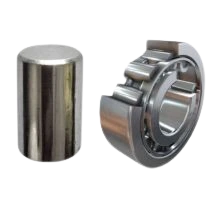Get A Quote
BIS Certification for Cylindrical Rollers for Rolling Bearings IS 9202:2020

Cylindrical roller bearings are
essential components in modern mechanical systems, designed to support heavy
radial loads and operate at higher speeds with reduced friction. At the core of
these bearings lie cylindrical rollers—precision-engineered
rolling elements that determine the overall performance, durability, and
reliability of the bearing assembly.
To ensure standardized quality and performance across all applications, the Bureau of Indian Standards (BIS) mandates that all cylindrical rollers used in rolling bearings conform to IS 9202:2020. This standard establishes the technical requirements, material specifications, and dimensional tolerances for cylindrical rollers and is a key part of India's broader effort to improve the quality and safety of critical engineering components.
Understanding Cylindrical
Rollers and Their Applications
Cylindrical rollers are shaped like
cylinders with precisely controlled diameters and lengths. They are typically
used in cylindrical roller bearings,
which are characterized by high radial load capacity and the ability to support
high-speed rotation. These bearings are commonly found in:
Depending on the design, these bearings may have single or double rows of rollers, and they can be separable or non-separable. Their versatility and mechanical robustness make them a preferred choice in critical, high-performance systems.
IS 9202:2020 – Indian
Standard for Cylindrical Rollers
The Indian Standard IS 9202:2020 sets out the comprehensive
requirements for cylindrical rollers used in rolling bearings. It ensures
consistency in manufacturing and performance, supporting interchangeability and
reliability across diverse sectors.
This standard includes specifications
for:
By conforming to IS 9202:2020, manufacturers can ensure their cylindrical rollers meet the rigorous demands of modern engineering applications.
BIS Certification
Requirement and Legal Compliance
Under the BIS (Conformity Assessment) Regulations, 2018, cylindrical rollers
used in rolling bearings are required to be certified and marked with the ISI Standard Mark. This certification
falls under Scheme-I of Schedule-II,
and it is mandatory for both domestic
manufacturers and importers.
To legally sell or distribute
cylindrical rollers in India:
This ensures that only verified, high-quality products enter the Indian market, protecting consumers, industries, and infrastructure from substandard components.
Certification Process
The BIS certification process for
cylindrical rollers involves several steps to verify compliance with IS
9202:2020.
- Application Submission: Manufacturers must submit a detailed application through the BIS online portal, providing product specifications, test reports, and manufacturing details.
- Factory Audit and Sampling: BIS officials conduct a thorough inspection of the manufacturing site, assessing quality control systems and collecting product samples.
- Laboratory Testing: Samples are tested in BIS-recognized labs to verify that they meet all technical parameters outlined in the standard.
- License Issuance: Upon successful evaluation, BIS issues a license allowing the use of the ISI mark.
- Surveillance and Renewal: Periodic audits and random sampling ensure continued compliance.
This system ensures transparency, accountability, and consistency across the supply chain.
To Know The Process in Detail, Please Visit:
Under BIS Registration Products ISI and CRS
Documents Required for BIS Certification
To apply for BIS certification, manufacturers need to submit the following documents:
● Application form
● Manufacturing process details
● Quality control plan
● Test reports from BIS-approved laboratories
● Factory layout and equipment details
● Proof of business registration
● Product specifications and technical details
● Declaration of conformity to Indian standards
Additionally, manufacturers may be required to provide proof of compliance with environmental and safety regulations, depending on the specific type of product being certified.
BIS ISI Mark Certification Costing And Timeline
Conclusion
Cylindrical rollers are much more than
simple mechanical elements—they are the heart of critical bearing systems in
machines that power industries. With the enforcement of IS 9202:2020 through mandatory BIS
certification, India is ensuring that only high-quality, performance-tested rollers are used in precision
applications.
Whether you are a manufacturer aiming
to expand into regulated markets or an industry buyer looking for trusted
components, compliance with BIS standards is not just a legal obligation—it is
a mark of excellence.
Free Call Back
Latest News & Update
📅 BIS Critical Component List (CCL) Updates for Solar PV Modules
🕒 BIS Fee Concessions for MSMEs and Startups | EVTL India
📅 Guidelines for Implementation of Essential Requirements for Security of CCTV
🕒 Omnibus Technical Regulation (OTR) Amendment Order, 2025
🕒 Extension of Timeline for Filing Annual Returns by Battery Producers
📅 Extension of Timeline for Filing Quarterly and Annual Returns for E-Waste
🕒 Extension of Concurrent Running Period for IS 302-1: 2008 and IS 302 (Part 1): 2024
🕒 BIS Guidelines for Grant of Licence (GoL) | EVTL India
📅 CPCB Guidance on filing of Application, Fees and more
🕒 CPCB Notification on Labelling of Plastic Packaging
📅 Mandatory Compliance for Input Materials of Steel and Steel Products for Imports
🕒 BIS Guidelines for Scheme-X Certification for OTR-Regulated Products
📅 BIS Upgrades Product Certification License Numbers to 10-Digit Series
🕒 BIS Certification No Longer Mandatory for 14 Chemical & Polymer Categories
Why Choose EVTL INDIA
Expertise in Indian Regulatory Standards
End-to-End Support
Trusted by Top Indian & Global Brands
Fast Processing & Transparent Pricing
Strong Liaison with Indian Authorities
Company Profile















